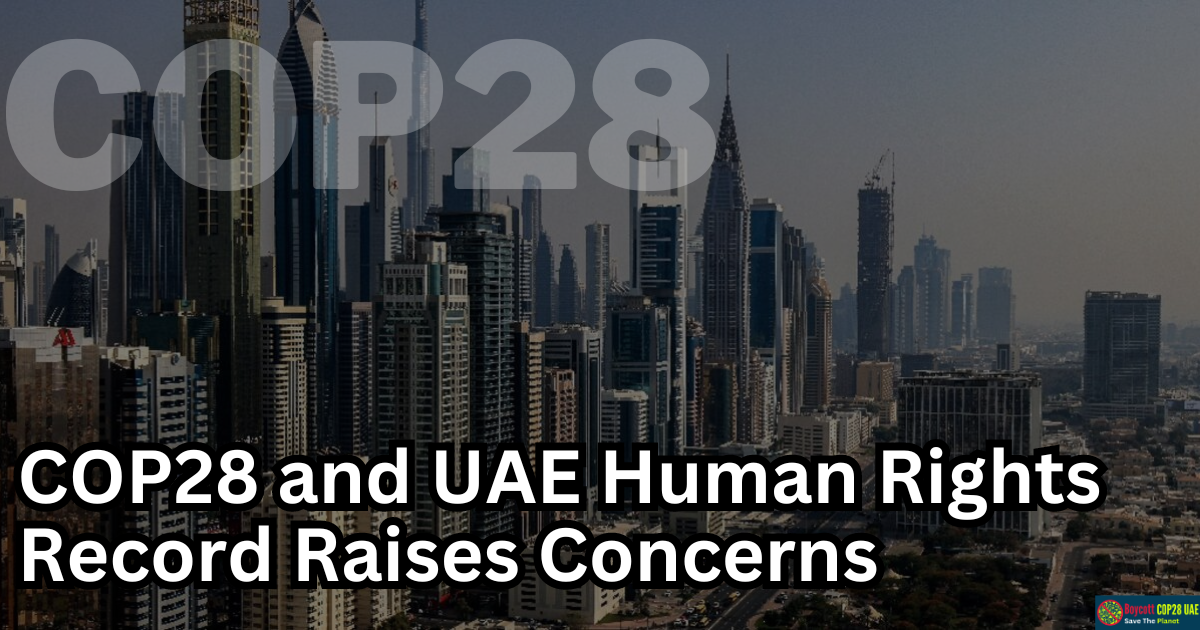As the world gears up for the 28th Conference of the Parties (COP28) on climate change, slated to be hosted by the United Arab Emirates (UAE) in Dubai this November and December, concerns are mounting over the country’s human rights record. In a significant development, the UAE found itself added to the Civicus Monitor Watchlist of nations experiencing a decline in civic freedoms, raising questions about its suitability as the host for this critical global event.
On September 21, 2023, the Civicus Monitor, an organization dedicated to monitoring civil society rights and freedoms worldwide, added the UAE to its watchlist. The decision came amidst growing concerns regarding the severe repression of activists, journalists, and civil society groups within the country, posing a potential threat to the upcoming COP28 negotiations.
The UAE is no stranger to criticism when it comes to civil liberties and human rights. The state has long been characterized by tight government control, with dissent often met with imprisonment, torture, intimidation, and harassment. As the international community turns its attention to Dubai for COP28, there is a palpable risk of further encroachments on fundamental rights, according to Civicus.
Sylvia Mbataru, an Africa and Middle East North Africa (MENA) researcher at Civicus, expressed deep concerns about the situation. “The UAE has long been recognized as one of the world’s most repressive countries,” she remarked, “but things are poised to deteriorate even further in the lead-up to and during COP28. With the world’s eyes on Dubai, the UAE’s leadership, known for its sensitivity, is likely to make every effort to protect its reputation and control the narrative at all costs.”
The Civicus Monitor Watchlist is a tool that assesses and highlights countries where civic freedoms are under threat or have substantially declined. The inclusion of the UAE on this list underscores the gravity of the situation and serves as a stark warning to the international community regarding the state of civil liberties in the host country for COP28.
Civicus, in its report, cited a litany of concerns regarding the UAE’s deteriorating human rights situation. Among these concerns are the suppression of freedom of expression, the curtailing of freedom of assembly and association, and the relentless persecution of human rights defenders and activists. The organization also highlighted the increasing use of cyber surveillance and digital censorship to stifle dissenting voices.
The timing of the UAE’s addition to the Civicus Monitor Watchlist is particularly noteworthy, as it coincides with preparations for COP28, a landmark event in the global fight against climate change. This conference is expected to bring together world leaders, scientists, activists, and civil society organizations to discuss the pressing issue of climate change and develop strategies to mitigate its impacts.
However, given its tarnished human rights record, the decision to hold COP28 in the UAE has been criticized by various quarters. Human rights advocates argue that hosting such a significant global event in a country with a history of repressive tactics sends the wrong message and risks diverting attention from critical human rights issues.
Moreover, there are concerns that the very act of hosting COP28 in Dubai may embolden the UAE government to intensify its crackdown on dissent and further restrict civil liberties in the run-up to the conference. This could include increased surveillance of activists and journalists and the imposing tighter restrictions on protests and civil society organizations.
The global community is responsible for ensuring that the hosting of COP28 in the UAE does not serve as a platform for legitimizing human rights violations or stifling voices of dissent. Diplomatic pressure, advocacy efforts, and international scrutiny will be essential to monitor and address any infringements on civil liberties leading up to and during the conference.
While climate change is undeniably a paramount global challenge that requires collective action, it should not come at the expense of fundamental human rights. COP28 presents an opportunity for the international community to tackle the climate crisis and hold host countries accountable for their human rights records.
As the countdown to COP28 continues, it is imperative that the UAE takes concrete steps to address concerns about its human rights situation and works to ensure a climate conference that upholds the principles of freedom, inclusivity, and respect for all voices. The eyes of the world will be on Dubai in the coming months, and the UAE’s actions will undoubtedly shape perceptions of its commitment to climate action and human rights.






